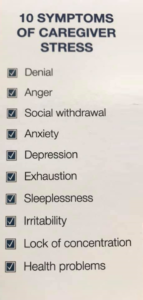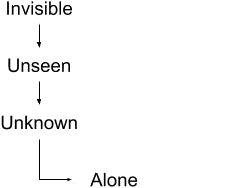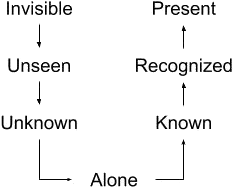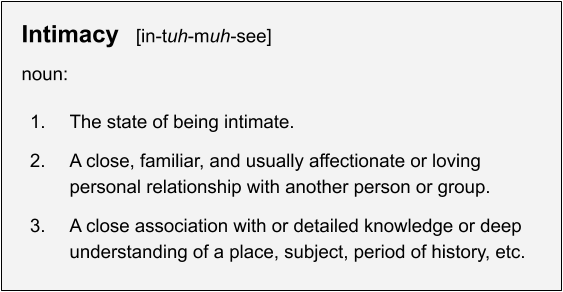This post describes, in part, the effects of a degenerative neurological condition called Huntington’s Disease. Any negative behavior on the part of my wife should be attributed to that condition. Any negative behavior on the part of myself should be attributed to my need for God’s ongoing grace.
The big news this week is that I got a call from Houston Hospice that Janet is stronger and so no longer qualifies for their services! While that is good news, there appears to be a little confusion. I was called by Jan’s hospice nurse Friday morning and was told at that time that Jan no longer qualified. Then Friday afternoon the same nurse came by the house and not only failed to mention her status change (which the nurse told me on the phone she would) but went on to tell Janet that she was going to get evaluated for PT under hospice next week – what?
Beyond that, there is a new symptom that I don’t think I have mentioned. She has suddenly started needing to know exactly where I am every minute. For instance, if I go to get her something at the store she will call me once while I’m on my way, at least once while I am there, and again as I’m on my way home. Not sure what that is about, but it’s not worth stressing over.
I remember the very first time I saw Janet. It was at a restaurant called “Friendly’s” that was across from Symphony Hall in Boston. As I explained previously, we met through a newspaper ad that I ran, so I didn’t know what she looked like. Unfortunately, I have to admit that the first thing that ran through my mind when I saw her was, “Man, she’s short.” But she packed a lot into a small package. From Friendly’s, we walked to a Thai restaurant that was around the corner, to have dinner. There I learned that she had just recently left teaching due to layoffs. She had also traveled internationally, visiting England, Scotland, and France – and liked trying new things like Thai food. Before saying goodnight, I remember thinking, “Yeah, this one is special. I’ll be calling this one back. Definitely.”
The first thing I need to say this week, is that the title above is a bit of a red herring as this post has absolutely nothing to do with either puppy dogs or unicorns. Rather, the title is a bit of dark humor that I will explain later. In fact, one of the things that I enjoy most about writing is being able to draw connections between seemingly disparate things, and in so doing, expose larger patterns in the world. However, making the connections that I have in mind this week won’t require much imagination at all.
Lately there has been a lot of conversation about being a “warrior” – I even wrote about it myself a few weeks ago. The problem is that there are two sides to everything, and being a warrior is no exception. There are the strong, heroic images of warriors in armor battered and bruised, but victorious! We love seeing those kinds of pictures where we can imagine ourselves or a loved one in the heroic role.
But another side also exists that is not so pleasant to consider. In addition to the prize that goes to the victor, there is also the price that the warrior has to pay in order to gain the victory. In the real world, all-out battle can sometimes extract a heavy toll in the form of a physical injury or disability, while at other times the injury is emotional or psychological in nature.
Yes, being an HD caregiver can be dangerous.
“Wait, what? Caregivers? I thought you were
talking about military veterans!”
What I’m talking about is a condition called Post-Traumatic Stress Disorder, or PTSD, and to be honest, up until a few years ago PTSD was for the most part only considered in terms of either the military or first-responders like the police, firefighters and EMTs. However, recent research is showing that anyone can feel the effects of PTSD, from little children to grandparents, and one of the top sources of PTSD in the civilian population is being a caregiver for someone with a long-term debilitating illness like HD.
Unfortunately, this condition is something I know about. I was diagnosed with it about 4 years ago as a result of my military service and something else that I will talk about later. In terms of the military, I was in the United State Air Force and my last duty assignment was in the Strategic Air Command, or SAC, where I was Radio Maintenance, or RM, flying on what was called the Airborne Command Post. One of our EC135s was in the air 24/7/365 for more than 5 decades. At the same time, we had crews standing by on ground alert, but we all had the same mission: Wait for WWIII to start, and if it did, fight it regardless of cost. To be clear, I in no way regret my service. It was the dedication of military men and women on both sides of the “Iron Curtain” that kept WWIII from ever happening. Since you are here reading this, it’s clear that our mission was a success. But for me personally, there was a cost: an inability to sleep, a trashed marriage, depression, emotional and social isolation, accentuated startle response, and flashbacks when fire alarms went off unexpectedly.
The thing that saved me was when God brought Janet into my life. She helped me see beyond the old pain and start healing by making it safe for me. She was also one of the few people I have met who fully understood what I was doing in SAC. She used to call me her hero for helping to protect her. Unfortunately, Janet is now dying of HD, and the stress is slowly bringing back the old symptoms – and a few new ones to boot. Recently, a fellow wrote on one of the HD support forums about the changes that his wife had started going through. I told him that, “…being a caregiver feels at times like you are literally living in a war zone.” Some days it takes an act of God for me to get to work and stay connected to the world around me.
But what is PTSD actually and what are the major symptoms? To answer that questions, you remember seeing this list online anywhere? This is PTSD symptoms in a nutshell.

For a more formal evaluation, I have also found an excellent website by the Anxiety and Depression Association of America, or the ADAA. This link is to the section specifically on PTSD. In addition to the quality of information, the other thing I like about this site is that it (like this blog) has a menu that allows you to select the language in which to display the contents, from Afrikaans to Zulu.
To help you gain insight into either your own condition or the condition of a loved one, there is an online evaluation you can take. Unlike other online tests I have seen, the result of filling out the form isn’t an answer, but rather an opportunity to print out your answers with a recommendation to see a doctor and share the results. In other words, you are pushed to get evaluated by a doctor, which is the responsible thing to do.
Unfortunately, that simple step can be the hardest. A friend from the UK recently told me that the waiting list for obtaining psychiatric therapy with the NHS was 2 years and even when you do get to see a doctor, according to my friend, “…they just want you to pop pills, it’s cheaper.” However, while pills may help you through a crisis, they are not a long-term solution, and what we need is a solution not for the next few hours or even the next month or so. We need a solution for the rest of our lives because the trauma that causes our PTSD doesn’t get better or go away. Like all our experiences, the trauma becomes part of who we are.
So if we can’t depend on “the system” to take care of us and our PTSD, what can we do? The option we have left is self-care, which obviously starts with awareness. Of all the posts I have read on the HD, Parkinson’s, and Alzheimer’s support groups I have yet to see even one that talks about PTSD and identifies it correctly. As caregivers we need to educate ourselves on this condition and be sharing with one another what we have learned. We need to be talking about it and sharing our stories of success and failure. We need to own what is going on inside our heads because if we don’t, it will own us.
The other thing we need to do is set reasonable expectations. There will be days when we are doing well, and there will be days when the old dragon will unexpectedly awaken, and we will have to respond – like a couple months ago when my sister was getting ready to welcome her 18th grandbaby, a boy. The other source of trauma that I didn’t mention earlier was that my second wife and I lost our first child, a boy, when he was three days old. In short, when I heard that my niece had gone into labor, my mind went into a tailspin and all I could hear was the beeping of the fetal monitor and the doctor saying over and over again, “The baby’s in trouble… heart rate is dropping… heart rate is dropping… heart rate is dropping…”
Physically, I was sitting at my desk at work, but mentally and emotionally I was in that delivery room 40 years ago. I was totally blindsided by something that I thought I had resolved decades ago. But the fact of the matter is that no one can ever say I used to have PTSD. The dragon may be asleep or quiet for a time, but it is never gone. No matter how “resolved” you think things are, there will be times when it will stretch out its serpentine neck and try to push you to the limit. We need to always be ready to counter those attacks using the same weapons of grace and faith that got us through the original trauma – especially if you don’t think it was grace that got you through originally.
So for me, reading the forums and answering questions is hard, and writing this blog can be very hard – but I soldier on because I know that each obstacle surmounted strengthens my faith, makes my vision clearer, and enlarges my heart. In fact, that is where the title of this post came from. The other day I was talking with someone about this post and I cried out at one point, “God, why can’t I just once write about puppy dogs and unicorns?” Giving this post that title is basically my military sense of humor kicking in to say to PTSD: you may always be part of me, but you are not me, screw you. (I’m no John Howard, but it works for me…)
In Christ, Amen ☩
A prayer for when your past comes calling unbidden…
“Blessed are You, Lord God, King of the Universe. It is right that I should at all times and in all circumstances bless You for the ways that you make all things new. But today I want to bless you especially for this thorn in my flesh. Thank you for using my past to make me stronger. Sometimes it hurts so much that I would rather hide away, but you have shown me again and again that when I am at my weakest, you are at your strongest. Thank you for not letting my life be ruled by random chance. Thank you for giving me the experience, skill and wisdom that will make me useful to you. Show me how to reach out to others despite my wounds. Amen”



